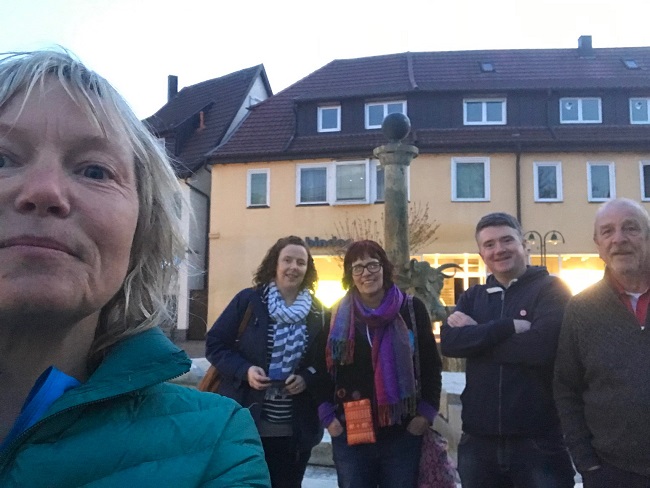Partnership project to promote social entrepreneurship in rural areas
In this blog, Ailsa Clark from Inspiralba tells us about a partner and rural representatives visit to Nurtingen, Germany as part of the ViSENet: Village Social Enterprise, Learning, Guidance, Network project to promote social entrepreneurship in rural areas.
The ViSENet (Village Social Enterprise, Learning, Guidance, Network) project is aimed to individuals who are interested in developing and sustaining their rural communities, who are willing to consider social enterprise solutions to assist their rural areas or individuals who already have an idea for social enterprise in rural areas.
The project will also provide learning and networking for individuals already engaged in social enterprise activity but wish to gain new skills, knowledge and expertise to assist them in their venture.
Social Enterprise solutions to sustaining services is well established in Scotland (and particularly rural Scotland). There are a wealth of examples of rural social enterprise running community shops, fuel filling stations, older peoples' services, community cinemas, swimming pools, youth services, and the list goes on.
There was recognition that the rural context has different challenges as well as attributes, where a collective leadership approach, alongside an enterprising skill set can deliver community led enterprise responses to challenges and opportunities. This enables communities to sustain vital services where there would be no market alternative and to maximise local assets for community benefit.
Social Enterprise approaches, are relatively novel in rural development across much of Europe. This is why there is a need to develop tools, resources, guidance and networking, bringing together examples of good practice in relation to rural social enterprise to assist local people across Europe to develop knowledge and skills. There is also a recognition across rural stakeholders in Scotland, that much of the social enterprise support ecosystem is influenced by an urban perspective, with a considerable focus on the ‘social entrepreneur’ as well as the promotion of high growth, including start up support, accelerator programmes and leadership learning resources. However in the rural context depth rather than growth can be favourable with a focus on community-led and collective leadership approaches for enterprising solutions. So there is much to learn from the rural expereince in Scotland and to inform future work, policy and delivery in Scotland.

To ensure we are on track with our development work, we held an initial partner and rural representatives meeting in Nurtingen in Germany in April. Five Representatives from rural social enterprise in Scotland attended the visit: Inspiralba, who provide business and project development and employability support for and with social enterprises across Argyll and Islands is one of the project partners, responsible for the development and delivery of the ViSENet project. For the visit to Germany Ailsa, from Inspiralba, was joined by Alyson McGilivrey from South Islay Development, Mick Eyre from Kilfinnan Community Forest, Bob Templeton from Glenbarr Community Development Association and Amanda Thorburn from Kintyre Recycling. This provided representation from well established rural based community development organisations that have established experience in social enterprise activity as well as those very new to the work and organisations with thematic expertise in forestry, health, wellbeing, employability and waste reduction.
We were able to reflect on the positive policy context we have in Scotland where the focus on inclusive growth as well as community empowerment, land ownership, renewables and social enterprise has assisted social enterprise activity to thrive across our rural communities.
The visit provided an opportunity for the project team to meet for the first time, as all the development work to date has been undertaken with virtual connection using zoom meetings and document sharing (thus demonstrating the value of digital tools for rural networking and development work), but it was really great to meet folks face to face for that human dynamic. It was also very valuable to have the input from the rural representatives who were able to share their experiences from different perspectives, countries, contexts and approaches. This highlighted the mutual value of networking and peer learning and the visit has provided a great basis for future networking in the project and further evidenced the value of networking for rural social enterprises. We were very happy to discover that rural reps felt that the project has something to offer them and they have something to give to the project and to each other.
The project is funded by EU Erasmus+ Strategic partnership for adult education. The Finnish National Agency for Education is hosting the national agency for the European Union’s education and youth programmes.
The project outcomes will include Open Access learning material, International Network of Rural Social Enterprises and Practical Guidebook of Good Practices for supporting the development of social entrepreneurship (SE) in rural areas, which will be developed over the next 18 months. Results of the project will be shared through disseminating outputs in the open access format. All products and materials will be available and accessible online to all who are interested in social entrepreneurship and community development.
This material can be shared more widely across Europe and potentially via Social Enterprise networks globally. There may be Scope for the British Council to add value and reach through their networks.
More information and links to the project’s materials will be available in project partner’s websites:
Estonian University of Life Sciences (EMU), Estonia: www.emu.ee/en/home/
· Contact: Roger Evans, evanter.ou@gmail.com and Lea Sudakova, lea.sudakova@emu.ee
The Bucharest University of Economic Studies (ASE), Romania: www.ase.ro/index_en.asp
· Contact: Carmen Paunescu, carmen.paunescu@ase.ro
Nürtingen-Geislingen University (NGU), Germany: www.hfwu.de/en/
· Contact: Roman Lenz, roman.lenz@hfwu.de
Inspiralba, Scotland: www.inspiralba.org.uk/
· Contact: Ailsa Clark, aclark@inspiralba.org.uk
University of Helsinki Ruralia Institute, Finland (coordinator): www.helsinki.fi/en/ruralia-institute
· Contact: Katja Rinne-Koski, katja.rinne-koski@helsinki.fi